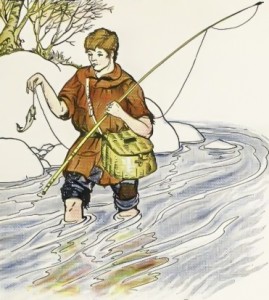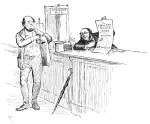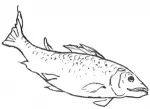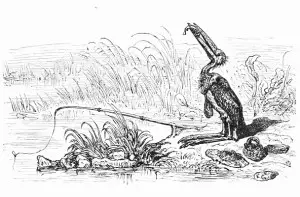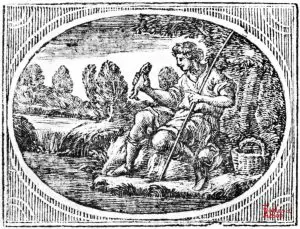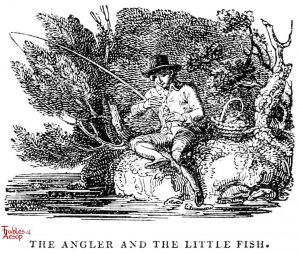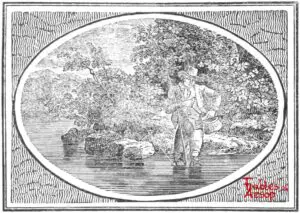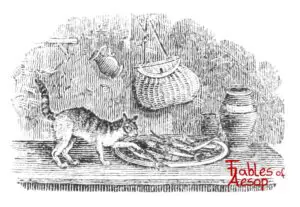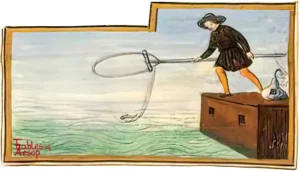A caught Fish pleads for life but the fisherman says no with no certainty of another.
A little thing in hand is worth more than a great thing in prospect.

Aesop For Children
A poor Fisherman, who lived on the fish he caught, had bad luck one day and caught nothing but a very small fry. The Fisherman was about to put it in his basket when the little Fish said:
“Please spare me, Mr. Fisherman! I am so small it is not worth while to carry me home. When I am bigger, I shall make you a much better meal.”
But the Fisherman quickly put the fish into his basket.
“How foolish I should be,” he said, “to throw you back. However small you may be, you are better than nothing at all.”
Moral
A small gain is worth more than a large promise.

Eliot/Jacobs Version
It happened that a Fisher, after fishing all day, caught only a little fish. “Pray, let me go, master,” said the Fish. “I am much too small for your eating just now. If you put me back into the river I shall soon grow, then you can make a fine meal off me.”
“Nay, nay, my little Fish,” said the Fisher, “I have you now. I may not catch you hereafter.”

Caldecott
A Fisherman cast his net and caught a little Fish. The little Fish begged him to let him go for the present, as he was so small, and to catch him again to more purpose later on, when he was bulkier. But the Fisherman said: “Nay, I should be a very simpleton to let go a good thing I have got and run after a doubtful expectation.”

JBR Collection
A Fisherman who had caught a very little Fish was about to throw him into his basket. The little fellow, gasping, pleaded thus for his life: What! you are never going to keep such a little chap as I am, not one quarter grown! Fifty such as I am wouldn’t make a decent dish. Do throw me back, and come and catch me again when I am bigger.” “It’s all very well to say ‘Catch me again,’ my little fellow,” replied the Man, “but you know you’ll make yourself very scarce for the future. You’re big enough to make one in a frying-pan, so in you go.”

Townsend version
A fisherman who lived on the produce of his nets, one day caught a single small Fish as the result of his day’s labor. The Fish, panting convulsively, thus entreated for his life: “O Sir, what good can I be to you, and how little am I worth? I am not yet come to my full size. Pray spare my life, and put me back into the sea. I shall soon become a large fish fit for the tables of the rich, and then you can catch me again, and make a handsome profit of me.” The Fisherman replied, “I should indeed be a very simple fellow if, for the chance of a greater uncertain profit, I were to forego my present certain gain.”

Samuel Croxall (The Angler and the Little Fish)
A MAN was angling in a river, and caught a small Pearch; which, as he was taking off the hook, and going to put into his basket, opened his mouth, and began to implore his pity, begging that he would throw it into the river again. Upon the man’s demanding what reason he had to expect such a favour; Why, says the Fish, because, at present, I am but young and little, and consequently not so well worth your while, as I shall be, if you take me some time hence, when I am grown larger. That may be, replies the man; but I am not one of those fools who quit a certainty in expectation of an uncertainty.
THE APPLICATION
This fable points much the same way as the sixty-fourth, so that one moral may very well serve for both. But the lesson they teach is so useful and instructive, that a repetition of it is by no means superfluous. The precept which they would instill into us is, never to let slip the present opportunity, but to secure to ourselves without a vain reliance upon, and fruitless expectation of something better in time to come. We may cheer up our spirits with hoping for that which we cannot at present obtain; but at the same time, let us be sure we give no occasion of condemning ourselves for omitting any thing which it was in our power to secure.

Thomas Bewick (The Angler and The Little Fish)
An Angler caught a small Trout, and as he was taking it off the hook, and going to put it into his basket, it opened its little throat, and begged most piteously that he would throw it into the river again. The man demanded what reason it had to expect this indulgence? Why, says the Fish, because I am so young and so little, that it is not worth your while taking me now, and certainly I shall be better worth your notice, if you take me a twelvemonth afterwards, when I shall be grown a great deal larger. That may be, replied the Angler, but I am sure of you now; and I am not one of those who quit a certainty in expectation of an uncertainty.
APPLICATION.
They who neglect the present opportunity of reaping a small advantage, in the hope that they shall obtain a greater afterwards, are far from acting upon a reasonable and well advised foundation. We ought never thus to deceive ourselves, and suffer the favourable moment to slip away; but secure to ourselves every fair advantage, however small, at the moment that it offers, without placing a vain reliance upon the visionary expectation of something better in time to come. Prudence advises us always to lay hold of time by the forelock, and to remember that ” a bird in the hand is worth two in the bush.”

Crane Poetry Visual
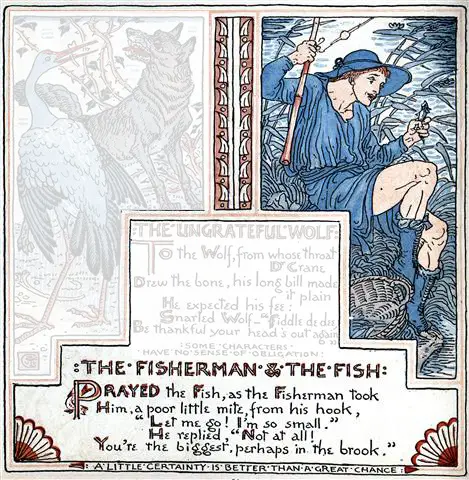
Prayed the Fish, as the Fisherman took
Him, a poor little mite, from his hook,
“Let me go! I’m so small.”
He replied, “Not at all!
You’re the biggest, perhaps in the brook.”
A little certainty is better than a great chance.

Gherardo Image from 1480

Pisciculus et Piscator
Piscator, iactis retibus, pisciculum tantummodo traxit. Qui cum parvulus esset, eum supplex rogabat, aiens, “Ne nunc, quaeso, me capias, sed potius, quandoquidem sum tam parvus, relinque. Postquam autem crevero ac maior ero, tunc me comprehendes tibique maiorem quoque utilitatem feram.” Ad haec autem piscator ait, “Ast ego profecto stultus essem, si, quod manibus habeo, quamvis sit leve, lucrum abiecerim ac illud persequi vellem quod, magnum sit licet, in incerta spe tamen omnino consistit.”
Perry #018
